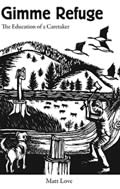
In 1974,
New Yorker magazine published a 6,000-word article about Oregon's unprecedented governing initiatives under the leadership of departing Republican Governor Tom McCall, then near the end of his second and final four-year term in office.
McCall called the initiatives, collectively, the Oregon Story. In the article, McCall described the Oregon Story as one of "innovation and regeneration that can actually be used anywhere. We're trying to export the hope and the formula."
By 1974, Oregon could boast of many recent political innovations, most of them nationwide firsts: protection of ocean beaches from privatization and development, a law dedicating one percent of highway funds for bicycle and pedestrian paths, a mandatory five-cent deposit on returnable cans and bottles, an effort to clean up the polluted Willamette River, visionary land use planning to preserve farm and forestland, a forest practices act, and an astonishing level of voluntary energy conservation promoted by state government.
Everyone who has ever spent any time in Oregon and walked on an ocean beach has benefited from the bold bipartisan political initiatives achieved during the McCall era. In effect, these initiatives led Oregon to become within a generation one of the most desirable places to live in the country.
Older generations of Oregonians certainly remember the importance of Tom McCall and the Oregon Story. But what about Oregon's schoolchildren? Do they know the story of Tom McCall and why they get to play on the beaches for free? Or ride their bikes on dedicated bike paths? A curriculum that teaches about Tom McCall's leadership and the Oregon Story is long overdue for Oregon schoolchildren.
That day has finally arrived and it behooves all Oregon elementary and secondary teachers to investigate how to integrate an exciting new (and free!) online multi-media curriculum called Tom McCall: A Better Oregon into their classrooms. I've taught social studies and language arts for 14 years in Oregon public schools and declare it by far the best teaching resource on modern Oregon history and politics that I've ever encountered.
Compiled by Marilyn Walster and hosted by the Oregon Historical Society, "Tom McCall: A Better Oregon" features study units, lesson plans tied to state standards, audio, slide shows, and video.
My favorite section of the curriculum is the compilation of fantastic McCall quotes, including my favorite:
Oregon is demure and lovely, and it ought to play a little hard to get. And I think you'll be just as sick as I am if you find it is nothing but a hungry hussy, throwing herself at every stinking smokestack that's offered.
Does any Oregon politician feel that way anymore, let alone say it publicly?
The goal of the curriculum is to educate students about their personal connection to Tom McCall and the Oregon Story and inspire them to design and implement a community service project that protects its legacy. I was so motivated that I had my journalism and photography students at Newport High School produce a 32-page magazine called Sandtuary, which extols the virtues of Oregon's unique heritage of publicly-owned beaches. We distributed 3,000 copies of it and received marvelous feedback from readers, many of whom had never heard of Tom McCall or the 1967 Beach Bill he signed into law.
I urge all Oregon teachers to spend some time on the site and think about how to teach about McCall next year. At the very least you will educate yourself about a special politician who unequivocally made your life better. He might also be the very reason you moved to Oregon.